Anatolia: The Turkish Heartland
- Aaron Schorr
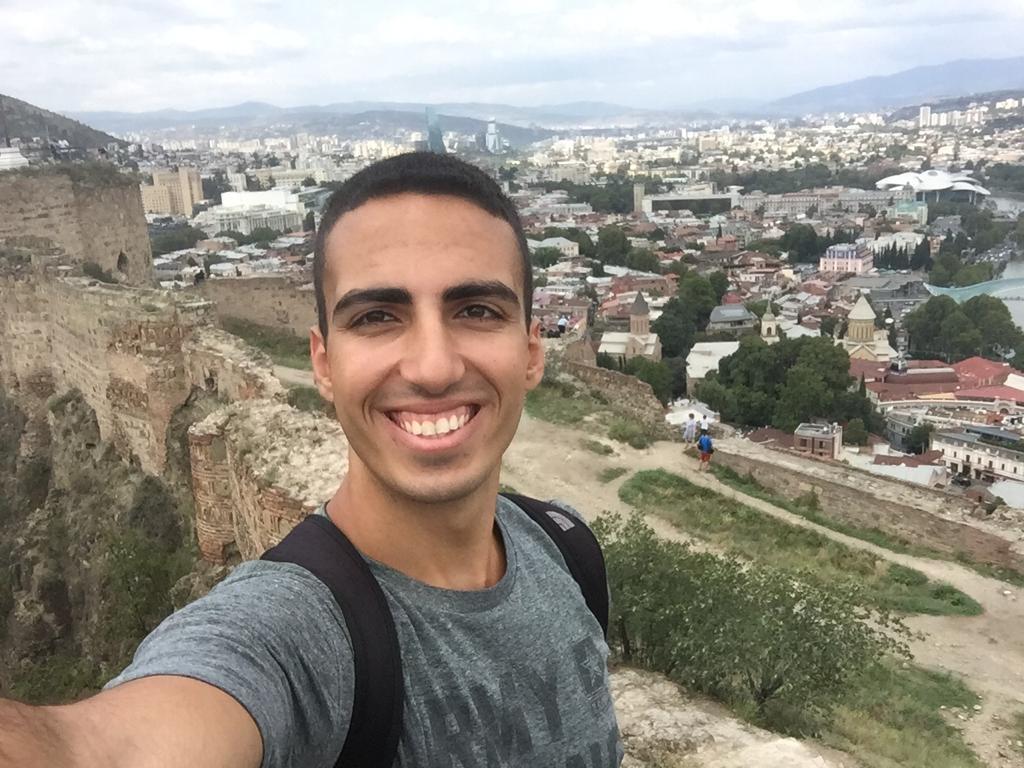
- Aug 3, 2021
- 17 min read
I'm back! At this phase in the pandemic, international travel is a sophisticated game of roulette in which the losers get deported or quarantined. Or as my mother kept repeating in my vicinity over the past several weeks, "now really isn't the time to be traveling."
Nevertheless, Yotam - my best friend from the army (see my post on Hanoi from February 2020) - and I decided to go backpacking this summer, and eventually settled on Turkey. When we bought our plane tickets, there were no restrictions at all, and Israelis were free to visit as they wished. Last week, however, the Israeli government announced that Turkey would be added to the list of forbidden travel destinations starting Friday, 30 July, punishable by a 5,000 NIS ($1,550) fine. Our flight was scheduled to arrive at 3:50 pm on Thursday.
With no idea of whether we would be allowed to travel, we arrived at the airport and hoped for the best. We had to show letters of permission from both the Israeli and Turkish governments, as well as vaccination records and negative test results, but everything ran smoothly.

"Israel is very funny"
We landed in Antalya and walked off the plane into the scorching heat. It was 40⁰ C (104⁰ F), but the air was so dry that I could feel the sweat evaporating off my palms.
A car picked us up and we set off towards the rental parking lot. Traffic was very hectic exiting the airport and our driver, Oğuzhan, was getting visibly agitated at the big black vans that kept cutting us off. "They drive like they think they have personal insurance from God," I said. "That's an interesting way to explain the situation. Don't trust anyone on the road here. I don't even trust myself," Oğuzhan warned us as another black van made an illegal turn nearly into us.
Renting the car was a minor fiasco, as it always is, and they didn’t like any of the four (!) credit cards I offered them. At least we had Oğuzhan to keep us company with his opinions on Israel, qualified by his credentials as an international relations student.
“Israel is very funny. It gets so much financing from the US, but it fights with countries that also get financing from the US. Now they will all be friends.”
My cards continued to decline.
“I can’t judge Israel for what it does as a country, because it is a success story, tamam?” The conversation eventually shifted to religion, where it turned out he also had some profound insights.
“Are you Christian?”
I replied that I was Jewish, and Yotam got the same question.
“I am Muslim, yes, but I have so many questions. How can I be so passionate about something I can’t touch or see?”
We tried shifting the conversation back towards our payment situation, which prompted him to read off long passages from the rental agreement. One of the cards eventually worked, we signed the necessary papers, and set off, promising not to trust anyone but ourselves.
Welcome to the Turkish backpacking scene

The traffic into the city was bad, but not as bad as I had expected, which was a promising start. It was clear that English-language road signs were going to be a rarity, but the strangest part was the speed limit: 82 km/h. At that point, why not make it 83 and go for the novelty of a prime number?
We drove down a maze of side streets and checked into a small hostel. The guests were preparing a communal dinner, so we headed out to the local supermarket to make shakshuka. Supermarkets in foreign countries are always interesting places, and this was no exception. There were about five kinds of tomato paste, all in massive jugs and purplish in color. All of our purchases would likely have cost around 120 NIS ($37) in an Israeli supermarket; here, it was 71 lira ($8.4). Hooray, PPP!
We made our shakshuka and sat down to have dinner with the rest of the guests, many of whom had lost their shirts in the 34⁰ (93⁰ F) evening air. An Argentine woman had made potatoes and salad, two Hungarians had made pancakes, and someone had bought a case of beer. There was also a Moroccan girl on vacation from her master’s program in Turkish-occupied Cyprus, two locals, and a bunch of Spanish speakers, including the Argentine who had cooked at the Everest base camp this past climbing season. No hostel would be complete without a German, and ours - Jan - had been on the road for two years (“life in Germany is absolute shit”) and told us the story of his arrest in the Mexico City airport for failing to arrive with a return ticket. He spent 2 nights in an 8-man cell with 16 other men and was deported back to Germany (noted for future reference). The Hungarians had traveled overland from their hometown of Szeged, and spent the last five nights camping in places ranging from a roadside café to a mountaintop under the protection of a local mafia boss, who drove them up in a black Mercedes and told them to call him if anyone bothered them. They were very happy to sleep in a proper bed again.
Dinner was great, but we really needed a shower after the day’s crushing heat. The showers on our floor had a motion-activated ceiling lamp, but showering wasn’t quite enough motion to trigger them. The water kept fluctuating from boiling hot to ice-cold, so we had to hop up and down in the stalls to keep the lights on as we frantically changed the temperature, all the while trying not to slip and fall.
“Five star terrace, one star price!”
The air conditioning struggled to keep up with the oppressive nighttime heat, but we eventually managed to fall asleep. It was the first bunk bed I had slept in since Vladivostok in March of last year. Over dinner, we had invited the Moroccan girl - Ikram - and the two Hungarians - Levente and Dioméd - to join us on a visit to a waterfall near town the next morning. Yotam and I had strange pastries from a nearby bakery for breakfast, and we all set off out of town. Instead of the waterfall, Google Maps led us to a village with the same - more precisely, to a little farm road between tomato fields. Thankfully, it was only a 10-minute detour, and we parked in a very official-looking parking lot blanketed with flags I wasn’t accustomed to seeing - Turkmenistan, the Turkish Republic of Northern Cyprus, and the Free Syrian Army stood out among the more familiar European ones.
The waterfall was beautiful, even if its state in late July was somewhat less impressive than I had expected. We walked past several restaurants, and one of the owners invited us in. “Come in! Five star terrace, one star price, because it’s so cheap!” We all laughed. The park itself was full of Turkish families and comically overdressed Russian women, all trying to pose without getting too wet. We were evidently the only ones who thought to bring bathing suits, and no - there were absolutely no signs prohibiting entering the waterfall. The water was delightfully cold in the 40⁰ (104⁰) heat, and the Russians kept taking photos.
We dropped our passengers off on the motorway back to Antalya and continued east along the coast. A short drive brought us to Aspendos, an Ancient Greek and Roman city famous for its theater. The place was truly remarkable, built in 155 CE, designed to seat 12,000 people, and preserved almost to perfection. If it hadn’t been 40⁰ with a cloudless sky, we would have explored the rest, but the ruins offered no shade.
We continued east towards large plumes of smoke that were clearly forest fires. The previous day, Oğuzhan had said that these were acts of terrorism from the PKK, but I was skeptical. Whatever caused them, they briefly caused the sky to turn orange and derailed our lunch plans. With a speed limit of 82 km/h and speed cameras and traffic lights everywhere, the road was maddening to drive on, but the most absurd part was the police. Nearly every intersection - and there were many - had two Trafik Polisi cars and a number of officers milling about, in what seemed like a bizarre Keynesian exercise at the expense of the Turkish taxpayer.
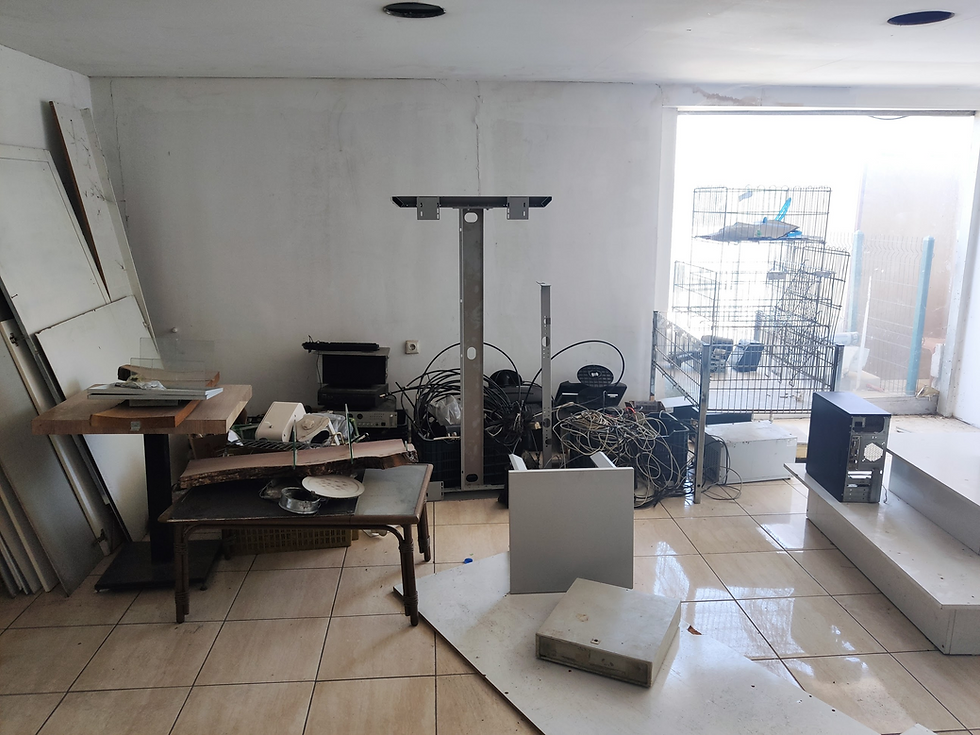
We turned north and started climbing into the mountains. Eventually, the smoke cleared and we saw that we were nearly at the treeline, with no sign of the dense coastal settlement we left behind. The road quality did not correspond to the speed limit, so some badly-surfaced roads were 110 km/h, and some dual carriageways were 70, but at least the speed cameras were much less frequent.

Döner faux pas and Improved Digs

We stopped climbing and passed the city of Seydişehir, past which the road became very empty and the scenery transitioned to scrubby desert. After 3 hours of driving, we arrived in Konya, a city which according to road signs was home to both 1.3 million people and the 2022 Islamic Solidarity Games (a Muslim Makabiya? Sounds fun). Stepping out of the car was a beautiful moment, as the temperature had dropped over 10⁰ C without an increase in humidity. We found a highly-rated place selling döner, which we assumed was the famous Turkish kebab, on Google Maps, and were surprised to find a sit-down restaurant with smart-looking waiters in ties and white shirts. There was no menu, as there were only two items on offer: döner or iskender. A bunch of hand gestures later, our waiter came back with plates of ingredients for a kebab sandwich - salad, onion, fries, and chili peppers. He then emerged with two heaping plates of meat and some sort of sizzling sauce, which we only had enough time to wonder at before another waiter swooped in and replaced the plates with a more familiar-looking flatbread stacked with the same kind of meat. It was all very confusing, and we were clearly eating it wrong, but it tasted good. The best part was the bill - 70 lira ($8.4) including dessert; our bottles of mineral water were half a lira (6 cents) apiece. Our car had even been washed while we ate.
We headed into town and visited the Alâeddin mosque, initially constructed in the 12th century. The mosque itself was big but not special, but there was a hidden mausoleum with the tombs of several Seljuk sultans inscribed in beautiful Arabesque.
The grounds of the mosque were immaculate and served as a downtown park, full of families and young people in the pre-sunset hour. The surrounding area felt like an Asian city for the first time, with lots of big vertical signs, food shops, and chaotic intersections. We got some fruit and I noticed the shopkeeper was speaking Arabic to his young son.
“‘Arabi?”
“Na’am.”
I asked him where he was from, and he said Aleppo. In my non-existent Arabic, I told him that my mother was from Aleppo, but I only spoke English (since my knowledge of foreign language names in Arabic was limited to inglezi). His face lit up, we shook hands, and wished each other well. I wonder how he would have reacted had he known my true story.
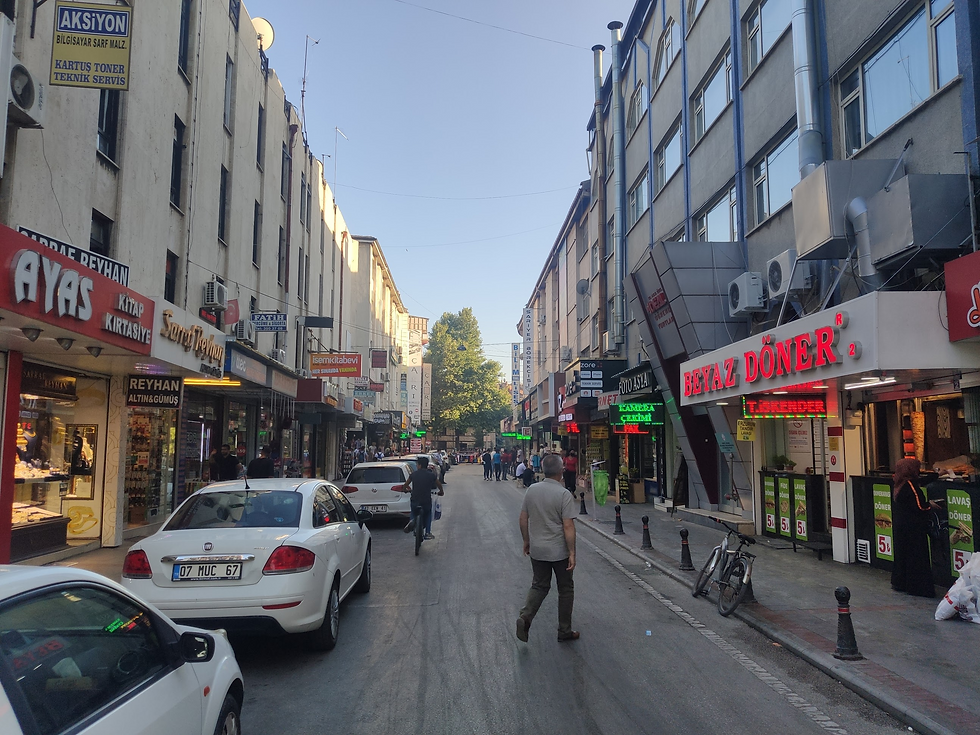
Konya was not exactly on the Turkish backpacker trail, meaning there were no hostels worth staying in. A quick online search, however, revealed that we could book a room in a five-star hotel for only $48 a night. I don’t know if I would have given the hotel five stars, but it was definitely much nicer than anywhere I had planned to stay. The hotel also had a spa, which we visited after checking in. Nobody spoke any English (even the hotel receptionist could barely communicate with us), but that didn’t stop the spa receptionist from giving us instructions in rapid-fire Turkish. Google Translate saved the day once again, and soon enough we found ourselves in a sauna, with cold watermelon seltzers served to us at the end.

Welcome to Cappadocia
After some very broken communication with the breakfast buffet staff, we got Yotam a SIM card, a 30-minute process which involved taking three dozen photos of his passport (presumably one for each intelligence agency willing to pay for it). Leaving Konya, there were mountains in the distance, but the road was arrow-straight through a desert plain. The only features were the trees lining the road and an occasional field or factory. We sped east for two hours before the highway suddenly became unpaved. Nobody was driving much slower, however, and bits of gravel kept pinging off our car. 15 nerve-wracking kilometers later, the asphalt returned and we began climbing again.
We arrived in the town of Uçhisar, first of many tourist towns in the historic region of Cappadocia. The region is best known for its impressive ancient cave dwellings and strange rock formations known as "fairy chimneys". The castle in Uçhisar was a great place to start, as it offered ample views of both. It being after Eid al-Adha (and a year and a half into the pandemic), however, meant that there were masses of domestic tourists who were just as impressed as we were.
We booked a hostel in the next town of Göreme, backpacker central in Cappadocia. We got some snacks at a local supermarket and sat to eat them on some steps. A man said hello to us in French and walked into the store. He emerged several minutes later, and tried striking up a conversation with us in French and Italian, to which I responded in Spanish and English. Two things he said for certain: 1. His name was Bahri, 2. There are tons of Jews in Turkey, 3. "Turquie est la plus belle du monde." He pointed at my beard - "'Arabi?" I gave him the spiel about my mother being Halabi in Spanish. He seemed impressed and walked away.
Speaking of the beard, it was time to do something about it. Yotam and I were both overdue for a haircut, and Google Maps said there was a barber just around the corner. I've gotten a lot of haircuts in a lot of unusual places, but this one might take the prize for strangeness. Of course, nobody spoke English, and after the barber was done cutting my hair, he dipped a cotton swab in some purple liquid, set it on fire, and waved it really close to my ears. I think the purpose was to burn off the hair on my ears but I can't be sure. After that, he rubbed alcohol all over my face and neck. At least he didn't do it the other way around.
We were going to wake up very early the following morning, so we decided to have an early dinner at a restaurant that Jake (see road trip) had recommended to me. We met two other guests at the hostel and offered them to join us - Danya, a digital marketer from Pakistan, and Bothena, an ER doctor born to Yemeni immigrants to Germany. They piled into the back seat and we drove to Ürgüp, the next town over to the east. The road there was paved with very rough cobblestones and snaked up an extremely steep hill. A sign said it was a 5% grade, but it was at least twice that, since our car stalled in first gear. Luckily, there was nobody behind us, so I rolled about 15 meters down the hill and gave it another shot, this time with success.
We made it to Ürgüp in one piece and tried finding the restaurant. Jake didn't remember its name, but he said it was near the post office. Those directions weren't good enough, but we still had a good dinner at a restaurant serving Gaziantep (southeastern Turkish) cuisine.
The sun was going to set before we made it back to Göreme, so we found a scenic spot on the map and headed there. The path up the hill turned out to be very steep and stony gravel, but I grit my teeth and we made it up with four intact tires. A couple was taking wedding photos, and the groom gave us some very dirty looks, but we kept our distance. The sunset was more stunning than my photos could possibly capture, and the view from the hilltop over the gold-washed valley was beyond serene.

We made it back to the hostel in Göreme and headed to the rooftop lounge. There we met Kailash, a recent Swiss-Indian college graduate who looked like a mixed-race Jesus, Srivhar, a middle-aged Norwegian man of Pakistani origin, and Surhab, an American-Pakistani living in Dubai. Our group, which probably had the highest concentration of Pakistanis in Turkey, headed out to a rooftop café. I couldn’t drink, so I ordered a “Churchill”, apparently a house specialty. The waiter returned with a glass filled with two fingers of lemon juice, and proceeded to vigorously shake salt into it and fill it to the brim with seltzer. It was even worse than it sounds writing it.
The World’s Most Instagrammable Sunrise
The sunset was incredible, but the real attraction in Cappadocia was the sunrise, when dozens of hot air balloons fill the sky. We woke up at 4:00 and headed up the mountain above town shortly thereafter. The past few days had been windy, so there was a backlog of people who had booked tickets and we couldn’t get tickets to fly ourselves, meaning we would have to make do with watching from the ground. It was still pitch-black when we arrived, and we found a quiet spot on the hilltop away from the rapidly swelling crowd. With the wind cancelling flights the previous few mornings, we had our fingers were crossed that today would be different. We could hear what sounded like giant fans in the distance, which was rather promising, but as the sky started to lighten we still couldn’t see any balloons.
The muezzins from the two villages below us seemed to be in a competition to out-sing each other announcing the dawn prayers, and suddenly it was light enough to make out the unmistakable shapes of hot air balloons being inflated all along the valley below us. We practically screamed with delight, and several minutes later, the spectacle began.

It’s difficult to describe the sensation of standing on a mountaintop in the sunrise as over 150 hot air balloons take to the sky all around you - travel blogs love the word “magical”; I think “sublime” is more apt, or at least “otherworldly”. We eventually moved towards the crowd to get a better view of the valley, but even the dozens of Turkish and Russian tourists around us couldn’t spoil the moment (but the Turkish man who chased us down because we brought two bottles of water almost did). Some of the balloons drifted towards us and passed only meters away, with two balloons even touching in mid-air. I was amazed by the degree of control the pilots had over a fundamentally unsteerable aircraft, guiding their balloons between ground obstacles like a plane. I really wished I had brought a camera.

The sun came up in full, some of the balloons began to land, and the crowd thinned out. We headed back down the mountain road, which now became an elaborate game of Rush Hour on a 9% grade, and took a two-hour nap at the hostel. The design of the hostel is worth mentioning here - our dorm was essentially a cave hollowed out into the mountain in the traditional Cappadocia style, even if the construction was much more modern. At 9:30, we were back outside to get picked up by a tour bus to explore more of the region, together with Bothena, Shahzad, and Kailash.
Caves, Cafés, and More Caves
We stopped at some very touristy sites near town - a viewpoint, a gemstone factory, a “natural Viagra” stand (I tasted a chocolate-covered chickpea, and it better help people with ED because it sure didn’t taste good) - and our guide gave lengthy explanations in sing-song English. It would have been fine if not for the brutal sun, which made anything not in the shade unenjoyable. Her name was Aysel - “but if that’s difficult, you can call me Hazel” - which meant that our group was called “the Hazelnuts”, which she loudly called out at every stop in order to maximize the cringe effect.
We drove west out of Göreme to the main attraction I had signed up for - the underground city in Derinkuyu. Aysel told us all to get ready - "Bring your masks with you because the security needs to see you with a mask in the entrance. Afterwards, we can continue as normal." It could have been Israel.
Cappadocia has many ancient underground cities, but Derinkuyu is the largest and most impressive. Likely built in the 1st century CE, the city housed early Christians escaping persecution at the hands of the Roman Empire. The city was later enlarged during the Arab conquest of Anatolia to house as many as 20,000 people, and served as shelter during the Mongol conquests and intermittently through the early 20th century. The guide didn’t mention this since it doesn’t fit the present narrative, but Christian locals used the caves to hide as late as 1911, after the massacre of tens of thousands of Armenian Christians in Adana. The city stretches 85 meters underground (nearly as deep as the world’s deepest train stations) on 7 floors, each of which can be sealed off from the others with heavy stone doors.
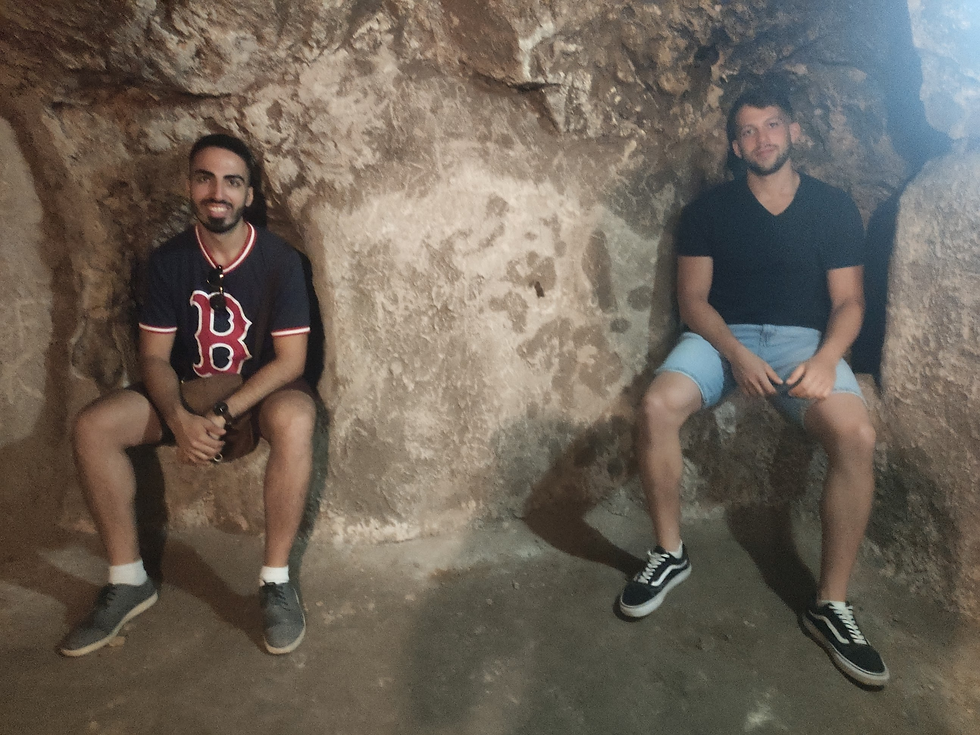

The underground city contained kitchens, store rooms, classrooms, a church, a town hall, and even facilities for livestock. It reminded me a lot of the Vinh Moc tunnels I saw in Vietnam’s DMZ, only almost two millennia older. Some of the tunnels were incredibly short in height, but the accomplishment of a persecuted minority building such an incredible structure with ancient technology was mind-blowing, and the natural climate control was heavenly - 10-15⁰ C (50-59⁰ F) year-round.
As we surfaced and drove towards our next destination, Bothena and I got into a fascinating conversation about geopolitics, European values, and the casual racism she encounters in her daily life in Germany, which pushed her to move to Hamburg from a small city in the west of the country. “If I send emails to 20 landlords with my name in the first line, I’ll get an answer from one of them, and that’s after I introduce myself as a doctor.”
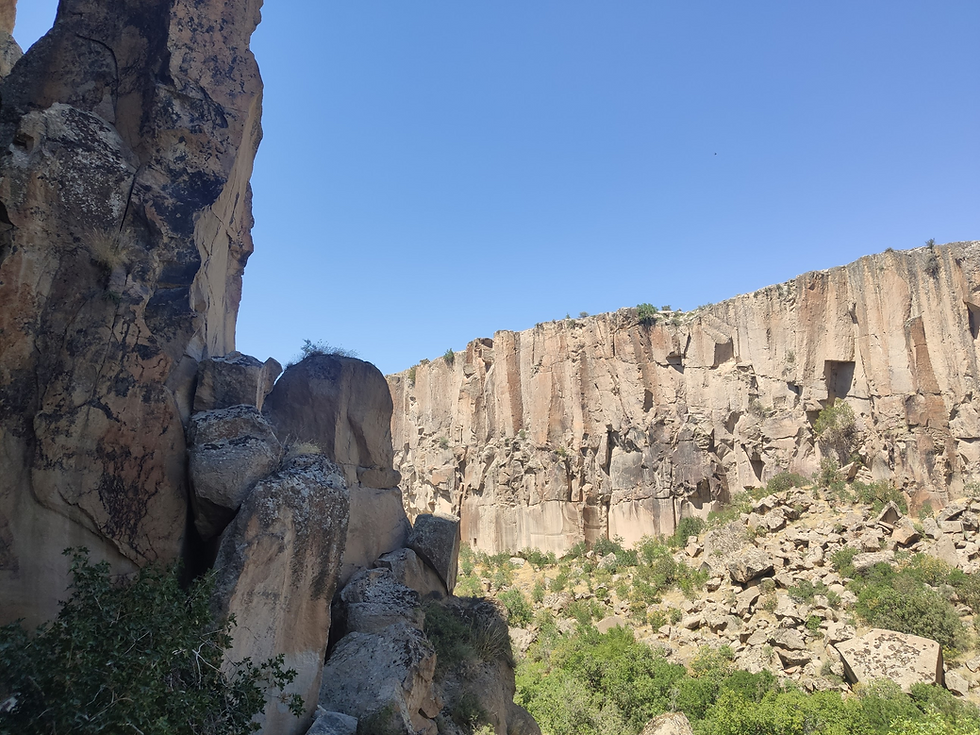
We arrived at the Ihlara valley, which looked like a much more dramatic version of Wadi Jilabun in the Golan Heights. We hiked for 3.5 km along the river at the base of the valley, but the high point was the two cafés in the river with tables set in the water and cabana-style structures for those who wanted to keep their feet dry. It was something Israeli parks could desperately use, and since this was Turkey, there was a 20-foot high flag hanging above the tables.
I had another fascinating conversation with Shahzad, who as it turns out spent the last several decades importing and distributing Bollywood movies in Northern Europe and knew an incredible amount about the political narratives of Bollywood and the different nationalist policies of India’s ruling BJP party, which apparently included banning Pakistani actors from appearing in films. He had also managed to get a seat on a hot air balloon that morning, and said they got participation certificates and popped champagne upon landing, which of course was around 7:00 am.
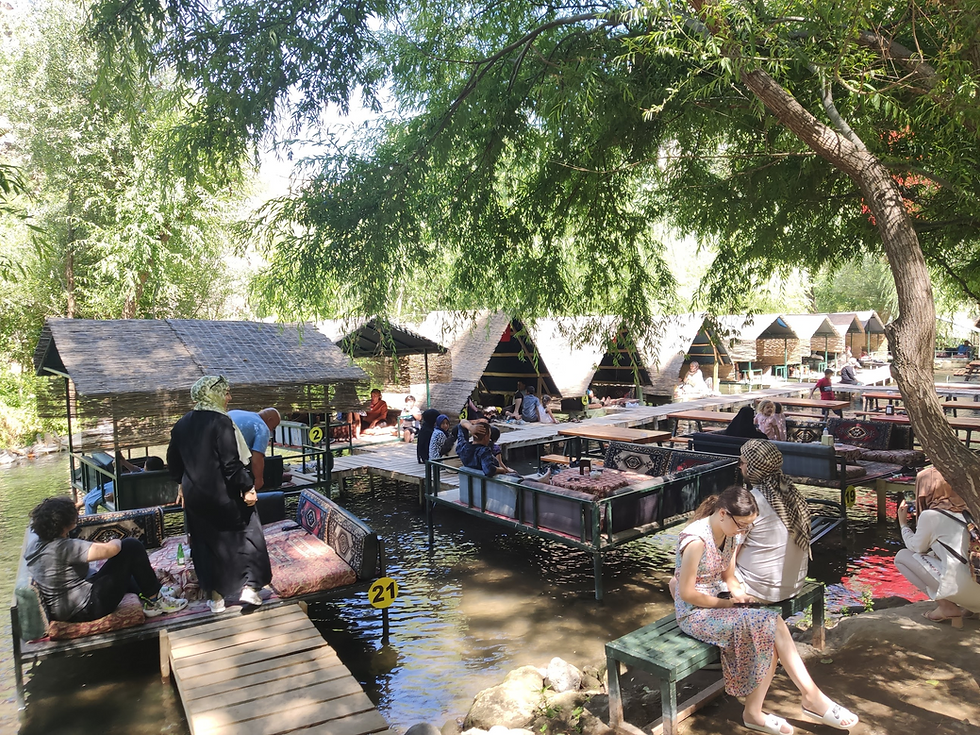
After a mediocre lunch in a restaurant above the second river café, we drove on to our final destination - Selime Monastery. This was a Christian compound cut straight into the rock in the 8th century, containing living facilities, a cathedral, and of course a monastery. The compound was like an archaeological theme park, and the cathedral in particular was highly impressive. Our group had the place to ourselves, and you could walk anywhere provided you watched your step. The Turkish conception of tourism site safety seems to be a near-polar opposite of the American idea, and some of the rooms simply had gaping holes in their floors.
Many of the rooms and their intricate façades were in unbelievably good condition, presumably thanks to the very dry air, and the surreal scene was made even more so by views of the ever-present fairy chimneys from the mountainside. The place looked so surreal, in fact, that George Lucas apparently considered using it for some of the desert scenes in the early Star Wars movies. The Turkish government didn’t like the idea, however, so he was forced to relocated to Tunisia. I normally dislike guided group tours with a passion, but this one was really great and ended up taking us to places we would have never encountered otherwise (plus Aysel was a big fan of Shtisel).
What Constitutes Ravioli?
The 1.5 hour drive back to Göreme was a hot, smelly hell, as the air conditioning in the bus seemed to be giving up and our group of 19 had been through a lot of sun and dust that day. We finally made it back, only to discover that the hostel was experiencing a water shortage, along with reportedly the rest of the town. With no way to shower, we rendezvoused and headed out to watch the sunset again. Surhab tried taking us on a shortcut, but it ended up being a dead end and we had to climb up some suspicious-looking ladder to get back to the road. The whole scene seemed like something straight out of Assassin’s Creed, and then we noticed we were in someone’s backyard with a short stone wall separating us from the road. The five males in the group hopped over, but Bothena struggled to get up and needed help from Darya, a Russian woman from the hostel who had joined us. We ended up finding a wheelchair in the yard and having her jump into it as I held it stable and two of the other guys helped her down, which probably made the #1 most ridiculous moment in a very long day.
All these shenanigans, plus a general lack of destination, meant that we were fast running out of sunlight. We crested a hill and the others insisted on running to the next one to gain ground and watch it set over the town, but I couldn’t imagine there would possibly be enough time to make it there and still get a decent view. The group ran ahead, and Yotam and I tried to find dinner.
We ended up at a restaurant called “Turkish Ravioli”, and naturally ordered the house special. It was a very bizarre dish, especially since it wasn’t ravioli at all. Instead, it was essentially Central Asian manti in yogurt and tomato sauce, which made for a strange flavor profile. The hummus was also not nearly as good as in Israel, and was evocative of American hummus for white people - all chickpeas, no tahini, not enough spice. The one actually good dish was a dessert made of figs with date honey and tahini (so they do know how to use it!), but all I really wanted was a cold beer to cap off the day. Instead, I had to stick with water, and the waiter made a big show of pouring us both water from a half-liter plastic bottle, which was doubly funny considering the present water shortage. I then realized that the restaurant would have a very hard time operating without running water, and confirmed this by washing my hands in the sink. Maşallah, the water was back on in the hostel as well, and I had the best shower in a long time.




















































Comments